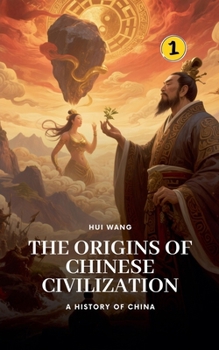The Origins of Chinese Civilization: A History of China
The Origins of Chinese Civilization: A History of China takes you on a journey through the myths and heroes who shaped the earliest chapters of China's story. It opens with Fuxi, the wise pioneer who taught people to read the patterns of the world, to fish and weave, and to live in greater harmony with nature-and with N wa, the compassionate Mother of Humanity, who stitched the sky back together and molded the first people from clay. Together they stand for the spark of civilization: the moment when chaos yielded to order and the world began to take on form.
Next comes the Age of Shennong, the divine farmer whose patient experiments with plants and soil handed humankind the twin gifts of agriculture and medicine. From that foundation, the light of civilization burns brighter under the Yellow Emperor-Huangdi-a figure of vision and warfare whose era, whether mythic or rooted in early history, is credited with many inventions, cultural practices, and a political unity that began to bind scattered tribes into broader communities. His story blends myth and memory, showing how a single leader's dream could weave disparate peoples into something more enduring.
You will meet Yao and Shun, the two sage kings celebrated for their humility and virtue, and follow the epic of Yu the Great-the man who tamed the cataclysmic floods and whose triumph, in tradition, gave rise to the Xia dynasty. Note that the Xia is the first dynasty in traditional Chinese accounts; its precise archaeological identification remains a subject of scholarly debate, but in the national memory it marks the birth of dynastic rule. What follows in that epic sweep are the rises and falls of the Shang and Zhou dynasties-each leaving behind their own legacies of power, ritual belief, and human ambition, and each helping to shape the long, complex story we call Chinese civilization.
Among the Zhou, one name still outshines the rest: the Duke of Zhou - a man whose loyalty, restraint, and iron sense of duty became the model for generations of rulers. He steadied a young dynasty, acted as regent for King Cheng, and set standards of governance and ritual that later thinkers would celebrate. By contrast, history warns us through the story of King You, whose recklessness is said to have led him to misuse the beacon fires to flatter a favored concubine; whether the tale is literal or partly legendary, it captures how misplaced desire and poor judgment can weaken a realm. In 771 BCE the Western Zhou fell amid raids by the Quanrong and internal betrayals, and the old stories - of brilliant counsel and damning folly - remind us that civilizations rise and fall not merely by force, but by the choices of those who lead.
In these pages you will walk beside gods and kings, merchants and farmers - the many voices that together laid the foundations of Chinese civilization. The Origins of Chinese Civilization: A History of China brings those voices back to life - vivid, human, and unforgettable. Whether you are new to ancient history or already steeped in China's legends, this book will carry you to the dawn of time and leave you looking at the world's oldest continuous civilization with fresh wonder.





